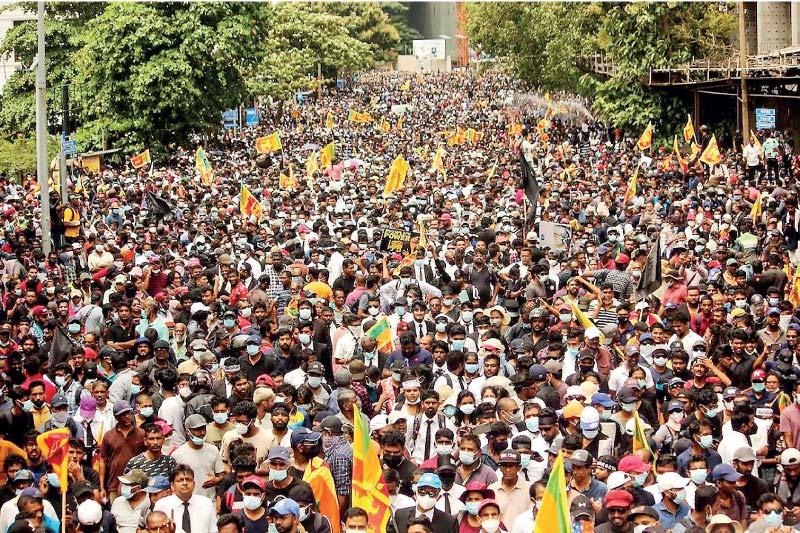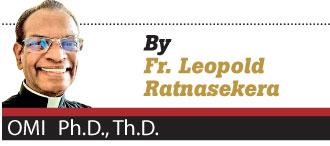Reply To:
Name - Reply Comment

Protesters fill the streets of Colombo ahead of President Gotabaya Rajapaksa’s resignation Photo Sakuna Miyasinadha Gamage
 A country plunged into sheer bankruptcy as well as facing the painful task of debt- restructuring, buffeted by unsteady leadership, burdened with human rights issues, Sri Lanka is still in the doldrums of her struggle to freedom and prosperity which seem still to be very illusive at the moment. New questions looming over the horizon in the country’s landscape are creating a highly explosive and complex situation making it increasingly difficult to manage the burning issues. The weak economic situation is basically the one bête-noire that is radically rendering all targets difficult to reach. A mere romantic dream and pledge of a distant era of economic prosperity and political stability does not seem to warrant a way out of the current vexing issues besetting the country at the moment. One has to be consistent and realistic in the way problems are approached, the solutions to which should be reachable and down to earth within a manageable time frame.
A country plunged into sheer bankruptcy as well as facing the painful task of debt- restructuring, buffeted by unsteady leadership, burdened with human rights issues, Sri Lanka is still in the doldrums of her struggle to freedom and prosperity which seem still to be very illusive at the moment. New questions looming over the horizon in the country’s landscape are creating a highly explosive and complex situation making it increasingly difficult to manage the burning issues. The weak economic situation is basically the one bête-noire that is radically rendering all targets difficult to reach. A mere romantic dream and pledge of a distant era of economic prosperity and political stability does not seem to warrant a way out of the current vexing issues besetting the country at the moment. One has to be consistent and realistic in the way problems are approached, the solutions to which should be reachable and down to earth within a manageable time frame.
 Having been deceived many a time from manifestoes that were false, people can ill afford to be duped yet another time. In short, it would not be incorrect to say, that democracy and elections had been brazen failures
Having been deceived many a time from manifestoes that were false, people can ill afford to be duped yet another time. In short, it would not be incorrect to say, that democracy and elections had been brazen failures
The proliferation of political parties and the surreptitious attempts to form alliances of all kinds in view of wooing voters to win elections and grab power has always been the deplorable social culture and philosophy of our politicians. One might wonder having browsed through the post-independent era political landscape in our dear motherland, whether the masses, the people themselves are a stumbling block and a serious obstacle for a genuine, honest and authentic leadership to emerge in the coming months in particular. The rate in which the hoi polloi are being drugged into false unrealizable and fanciful promises and pledges is shocking indeed. At one time, it was to create an era of people’s government (Apay Aanduwa) with nationalization as the main administrative feature of those in government.
At another time it was the opening of the country to the world trend of an open economy with free flow of goods and mammon into the country. With powerful companies sprinting pell-mell into profit-making sprees and foreign companies infiltrating into local industries displacing them unmercifully, people wounded up getting used to importing all kinds of goods to the detriment of local products almost disappearing. Then came the era of mega-projects of airports, harbours and expressways that opened wide the doors to massive defrauding of funds and of course the sad and regrettable trend of taking commissions. This evil era was under the imaginary dream advocated as making Sri Lanka a second Singapore and out-do it even by making the country “the Wonder of Asia”. The political manoeuvres during this time preyed heavily on the public opinion resulting in wrong perceptions of people at large who made rather immature, superficial and unjustifiable political choices in the exercise of their freedom to vote. Our elections have always been a travesty of franchise. The most recent struggle of people’s peaceful “Aragalaya” showed the utter weakness of the entire political system as such at work and which led this one-time promising democracy into miserable depths of bankruptcy. This was certainly not the way things should have turned out in a country that had been independent, sovereign and democratic for seven long decades. A dark age has come over the country too soon. Governance and public administration left much to be desired and carry a big chunk of blame for the downturn of the country. Bribery, waste, abuse and corruption had infiltrated into the rank and file of civil administration and public service. While monetary policy almost became disabled, the fiscal policy decisions too were taken hastily and were found to be alarmingly deceptive and short-sighted.
Though there is an apparent calm in the country, it is not at all that rosy and one cannot be too complacent about the ad-hoc reforms planned and taken of ensuring a stable present and auguring a brighter future. There are a bevy of uncertainties that are vexing the nation and its people. The most troubling is the issue of debt-restructuring, internal and international that is imperative in the light of IMF’s pledge to assist the impoverished country. Already there is public unrest and outrage about certain measures that are being contemplated such as threats to EPF/ETF funds, taxation plans and selling of national assets. If some of these measures are pursued and heeded without due caution, there is sure to be a threat to both the sovereignty and the territorial integrity of the country. There is a polarization as well of political views and opinions brought about as a result of a plethora of political parties that have mushroomed and the various alliances being planned to in view of elections to woo the masses. Having been deceived many a time from manifestoes that were false, people can ill afford to be duped yet another time. In short, it would not be incorrect to say, that democracy and elections had been brazen failures.
 The proliferation of political parties and the surreptitious attempts to form alliances of all kinds in view of wooing voters to win elections and grab power has always been the deplorable social culture and philosophy of our politicians
The proliferation of political parties and the surreptitious attempts to form alliances of all kinds in view of wooing voters to win elections and grab power has always been the deplorable social culture and philosophy of our politicians
They have neither attained their due goals nor offered people the benefits that should have been accrued if they were truly workable and just. Politics has been a game cleverly played by astute politicians who know the art of turning and twisting people’s views and decisions.
Even with the colossal failures in the arena being so obvious, there still seem to be smart brains scheming to win back power. If things are turning that rosy, why do we still witness so many lining up the streets in protest: the farmers, the railway personnel, the nurses, the teachers and doctors with lawyers on the prowl in merciless criticism of some of the government’s decisions and policy orientation.
Just a few days ago a popular TV channel gave us an alarming list of factors that led to the bankruptcy of the country and those who should be held responsible for this man-made catastrophe that sunk the nation in deep trouble. The losses incurred stunningly run into millions of dollars and the equivalent in local currency is beyond our imagination. The problems of today are the result of harebrained unorthodox homegrown alternative solutions. The current leadership seems incapable of delivering on issues like reconciliation, political reform and addressing the devastating economic crisis. There is severe opposition to the current bill being discussed on the topic of terrorism. The measures meted out to offenses listed therein seem brazenly in violation of human rights specially matters pertaining to the freedom of media and in particular the social media.
The peaceful “Aragalaya” protest by the youth, the economic collapse and the memory of the untold hardships people went through provide excellent opportunities for the political education and conscientization of the masses (hoi polloi) of the country. They learnt through direct experience the cause of this collapse: it is greedy politics and absolute mismanagement in governance which showed a scandalous lack of accountability and transparency. The whole country has fallen with masses kept in blissful ignorance of the serious nature of the gradual deterioration that was politico-economic in nature until they found themselves stranded in long queues sometimes for days-on end, waiting for their needs. The “Aragalaya” and the national bankruptcy thus become ideal pedagogues to the nation. Hopefully, this island-wide experience will give the masses a more mature insight into their civic responsibility in electing to office strictly only those who will provide effective, honest and efficient leadership in true statesmanship. This is the dire need of the hour vis-a-vis people’s involvement in the rebirth and transformation of the nation.
 The current leadership seems incapable of delivering on issues like reconciliation, political reform and addressing the devastating economic crisis
The current leadership seems incapable of delivering on issues like reconciliation, political reform and addressing the devastating economic crisis
The future of this land and the hope of a system-change will largely depend not so much on the current breed of politicians who occupy various seats of power, but on how the masses will respond in their choice of intelligent options to this unprecedented crisis never seen before in our country. It is a crisis that drove away a failed President and a Prime Minister who had lost face and brought in thousands of youth in revolt clamoring for change that will not only alleviate the sufferings of the masses but also open a new page in the national history of the land in modern times. To achieve this noble goal, all must put their hands to the plough as Sri Lankans in true patriotism, transcending their differences be they ethnic, racial or religious. Even political ideologies can zero in on this common agenda, crucial for our survival. As it was once said so poignantly by a Catholic Bishop Helder Camara of Brazil: “One man’s dream, remains a dream. But when many dream together, it is the beginning of reality”. We have as models many neighbouring nations, who have dreamt this way, providing us a formidable paradigm of a salutary socio-economic and political recovery. This miracle is still possible, even at this eleventh hour when all seems lost, despairing, bewildering and beyond reach. This about-turn if pursued with daring and determination, is sure to guarantee Sri Lanka safely emerging out of the present debacle of being a banana-republic and a crumbling democracy weighed down with uncertainties.